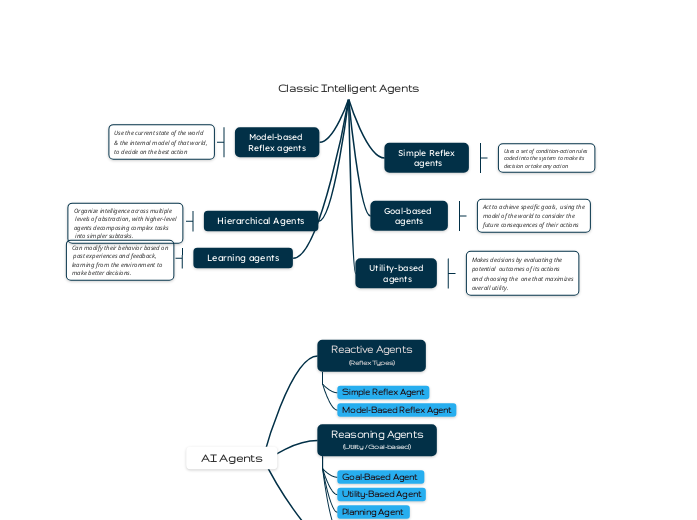Unified Evolutionary Topology Hierarchy of AI Agents and Agentic AI Systems
Generative AI (Post-2022 Foundation)
Modern Autonomous Systems (LLM-Driven Era)
Agentic AI (Multi-Agent Systems)
AI Agents (LLM-based, Single-Entity Focus)
Intelligent Agents (General Definition)
AI Agents
Agentic AI Agents
(Autonomous + Intentional)
MoralAgent / Cognitive Agents
LLM-Based Agent
(AutoGPT, Devin)
Reasoning Agents
(Utility / Goal-based)
Learning Agent
Planning Agent
Utility-Based Agent
Goal-Based Agent
Reactive Agents
(Reflex Types)
Model-Based Reflex Agent
Simple Reflex Agent
Floating topic
Product Use Cases
Search
FullText
Semantic
AI Criteria Tags
Filter + Result Page
Search + Result Page
Customers Say
Attributes/Tag generation
Sentiment Analysis
Summarization
Rrecommendation
Product Basket
Personalized
Popularity_based
Category Rec
Product Similarity/relevancy
DataOps
Security & Compliance: Ensuring data privacy (important for health-related apps) and compliance with regulations like HIPAA.
Monitoring and Quality Assurance: Ensure data quality, detect anomalies, and apply corrective actions.
Version Control & Collaboration: Managing different versions of data, changes in ML models, and collaboration among team members.
Data Pipeline Orchestration
Managing the flow from data ingestion
to storage and processing.
Data Storage / Data Lake
OpenSearch: If search and retrieval are key functions, OpenSearch (for analytics) can be used in combination with a data lake.
AWS S3: suitable for building a data lake.
Ingestion Layer
Real-time ingestion: For handling QA, user chats , calendar event updates
Batch ingestion: large data dumps like historical product data or user logs
Data Sorces
7. External, Knowledge_Base
6. Calendar Tracking: Time series data (appointments, events, etc.).
5. QA interactions (Bellysafe, Expert, ...) Text-based data.
Product
4. User clickstream data, system log, user preference
3. User Reviews
2. Product Meta , Details, Categories
1. Base data: User, Expert, ...tabular , text , geospatial
Can modify their behavior based on
past experiences and feedback,
learning from the environment to
make better decisions.
Organize intelligence across multiple
levels of abstraction, with higher-level
agents decomposing complex tasks
into simpler subtasks.
PEFT Methods
Selective
Fine-Tunning
Structural Masking
S-Diff pruning ,S-BitFit , FAR, Bitfit, SPT
Unstructural Masking
U-Diff pruning , FishMask , Fish-Dip , AM
Reparameterized
Fine-Tuning
LoRA Derivatives
Multiple LoRA
LoRAHub, MoLORA , MoA, MoLE, MixLoRA
LoRA Improvement
Laplace-LoRA , LoRA Dropout , LoRA+
Dynamic Rank
DyLoRA , AdaLoRA , SoRA , CapaBoost , AutoLoRA
Low-rank
Decomposition
LoRA , Compacter KronA , VeRA , DoRA
Additive
Fine-Tunning
Soft Prompt-based
Training Speedup
Soft Prompt Design
Prefix-tuning , p-tuning , Prompt-tuning , Xprompt, APrompt
Adapter-based
Multi-task Adaptation
AdapterFusion , AdaMix , AdapterSoup , MerA , Hyperformer
Adapter Design
Serial Adapter, Parallel Adapter, CoDA
Uses a set of condition-action rules
coded into the system to make its
decision or take any action
Use the current state of the world
& the internal model of that world,
to decide on the best action
Act to achieve specific goals, using the
model of the world to consider the
future consequences of their actions
Makes decisions by evaluating the
potential outcomes of its actions
and choosing the one that maximizes
overall utility.
Classic Intelligent Agents
Type in the name of the project that is under review, and press Enter.
Learning agents
Hierarchical Agents
Model-based
Reflex agents
Utility-based
agents
Goal-based
agents
Simple Reflex
agents

